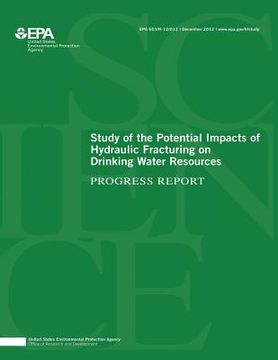Compartir
Study of the Potential Impacts of Hydraulic Fracturing on Drinking Water Resources (en Inglés)
Agency, U. S. Environmental Protection (Autor)
·
Createspace Independent Publishing Platform
· Tapa Blanda
Study of the Potential Impacts of Hydraulic Fracturing on Drinking Water Resources (en Inglés) - Agency, U. S. Environmental Protection
$ 46.82
$ 65.02
Ahorras: $ 18.20
Elige la lista en la que quieres agregar tu producto o crea una nueva lista
✓ Producto agregado correctamente a la lista de deseos.
Ir a Mis Listas
Origen: Estados Unidos
(Costos de importación incluídos en el precio)
Se enviará desde nuestra bodega entre el
Viernes 19 de Julio y el
Viernes 26 de Julio.
Lo recibirás en cualquier lugar de Internacional entre 1 y 3 días hábiles luego del envío.
Reseña del libro "Study of the Potential Impacts of Hydraulic Fracturing on Drinking Water Resources (en Inglés)"
Natural gas plays a key role in our nation's clean energy future. The United States has vast reserves of natural gas that are commercially viable as a result of advances in horizontal drilling and hydraulic fracturing technologies, which enable greater access to gas in rock formations deep underground. These advances have spurred a significant increase in the production of both natural gas and oil across the country. Responsible development of America's oil and gas resources offers important economic, energy security, and environmental benefits. However, as the use of hydraulic fracturing has increased, so have concerns about its potential human health and environmental impacts, especially for drinking water. In response to public concern, the US House of Representatives requested that the US Environmental Protection Agency (EPA) conduct scientific research to examine the relationship between hydraulic fracturing and drinking water resources. In 2011, the EPA began research under its Plan to Study the Potential Impacts of Hydraulic Fracturing on Drinking Water Resources. The purpose of the study is to assess the potential impacts of hydraulic fracturing on drinking water resources, if any, and to identify the driving factors that may affect the severity and frequency of such impacts. Scientists are focusing primarily on hydraulic fracturing of shale formations to extract natural gas, with some study of other oil-and gas-producing formations, including tight sands, and coalbeds. The EPA has designed the scope of the research around five stages of the hydraulic fracturing water cycle. Each stage of the cycle is associated with a primary research question: Water acquisition: What are the possible impacts of large volume water withdrawals from ground and surface waters on drinking water resources? Chemical mixing: What are the possible impacts of hydraulic fracturing fluid surface spills on or near well pads on drinking water resources? Well injection: What are the possible impacts of the injection and fracturing process on drinking water resources? Flowback and produced water: What are the possible impacts of flowback and produced water (collectively referred to as "hydraulic fracturing wastewater") surface spills on or near well pads on drinking water resources? Wastewater treatment and waste disposal: What are the possible impacts of inadequate treatment of hydraulic fracturing wastewater on drinking water resources? This report describes 18 research projects underway to answer these research questions and presents the progress made as of September 2012 for each of the projects. Information presented as part of this report cannot be used to draw conclusions about potential impacts to drinking water resources from hydraulic fracturing. The research projects are organized according to five different types of research activities: analysis of existing data, scenario evaluations, laboratory studies, toxicity assessments, and case studies.
- 0% (0)
- 0% (0)
- 0% (0)
- 0% (0)
- 0% (0)
Todos los libros de nuestro catálogo son Originales.
El libro está escrito en Inglés.
La encuadernación de esta edición es Tapa Blanda.
✓ Producto agregado correctamente al carro, Ir a Pagar.

